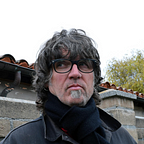A Hard Road—John Mayall (RIP)
#365Songs: July 23
I never stopped being influenced by John Mayall.
Just this year, I started over with him yet again. I read a new biography. I watched a new documentary. I checked out albums I’d either forgotten about or hadn’t ever managed to listen to in the first place.
Every time I return to the mine that is John Mayall, I come away with more riches.
I loved him from the moment I first heard him.
I was still a teenager, only just discovering roots and blues music. I was working my way back from solo Eric Clapton to Cream and The Yardbirds.
Fortunately for me, my parents didn’t own the “Beano” album. Instead, they had Crusade. It was Mayall’s first album to feature Mick Jones, and it was an extraordinary piece of work. I was totally smitten.
At that point, I was coming from a pretty folk-centric place. Minor chords meant a lot to me. One-chord drones meant a lot to me. I loved that Mayall’s music could feel so bluesy, so indebted to Chicago, and yet still have a modal, improvisational vibe. I thought “The Death of J.B. Lenoir” was one of the most beautiful things I’d ever heard.
I loved that the instruments on Mayall albums always served the whole. Despite all the guitar heroes that had come up through his ranks, his best work never felt like formulaic cycles of verse-solo-verse. They were proper compositions.
It meant a lot to me that, in addition to covering earlier material from other artists, he also wrote original songs. I prized songwriting from my earliest years, but they were hard to find in the blues world — at least, original songs that weren’t just reiterations of cliches. His songs stood out as having a real concept and voice to them.
Speaking of voice, it also meant a lot to me that he could sing the way he sang. I never had a good voice, but I came to find out over time that I did have a VOICE. And thanks to John’s example, I eventually gained the confidence to know that it didn’t matter whether my voice was good or bad; what mattered was that it was right.
As I began my professional career, musical evangelism was important to me.
In 1995, when my first album came out on Blind Pig Records, it didn’t feel like a lot of people were talking about Son House, Bukka White, Robert Pete Williams, Fred McDowell, Mance Lipscomb, John Hurt, Willie Johnson, and more. I felt called to help change that. Not because I thought I was special, but because it was an obligation. I’d learned so much from those artists, and loved their music so deeply, and I felt an intense pressure to share that passion and to increase awareness of their genius.
This is something I learned from John Mayall. I think more people discovered J.B Lenoir because of John’s song than for anything J.B. ever did himself.
In recent years, as I’ve worked to rethink, reconceptualize, and refactor how I approach music, John has emerged as a mentor for me all over again.
Any musician who’s worked with me, particularly in the last decade or so, knows my commitment to improvisation. I know it’s maddening to some people, but I believe in it. I believe in musicians trusting one another, and trusting the moment. I believe in being so present that you can make magic happen.
I don’t know that I even realized it, but this is something I learned from John Mayall as well.
It wasn’t until much later in my life that I came to really appreciate A Hard Road, and especially Blues from Laurel Canyon and The Turning Point. I wasn’t mature enough to comprehend what he was doing, or why. I think I get it now. Mayall once said:
“Improvisation is the main thing. You have your structure of the musical piece, and then you embellish it in whatever direction that evening’s performance entails. So, it’s always been the bedrock of everything I’ve done.”
I believe that to my soul. And I believe it applies not just to “the evening’s performance.” I believe it’s how you live life.
There have been many times in my life when I wasn’t sure how much longer my life was going to last. But here I am, still alive, still making music.
I don’t know that I’ll live to 90 as John Mayall did. And I know I’ll never have the kind of impact he did. But I do know that, for as long as I live, and for as long as I continue making music, I’ll be helping to carry his music and his spirit forward.
In “A Hard Road,” Mayall sings:
I’m gonna pack up my suitcase
Put my misery inside
Throw in a bit of pain and trouble
And that’s the road I’ll ride
Thank you John Mayall, for everything, and then some. For riding the road you rode, and taking us on the journey.
Deep bows to you.
~
Start following the #365Songs playlist today, and listen to each new song with each new article!
